As the Cossacks elected the king
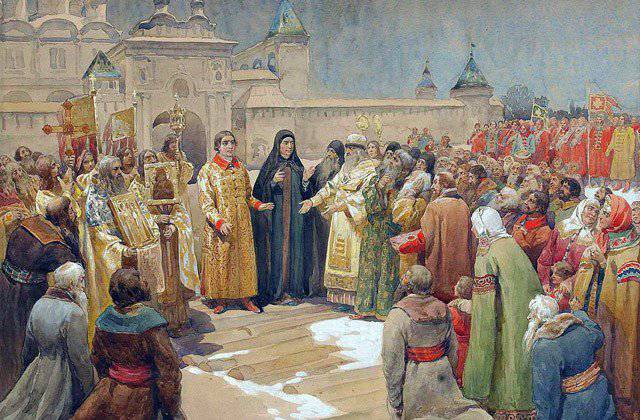
Don Cossacks played a decisive role in the choice of Mikhail Romanov at the Zemsky Sobor of 1613 by the Tsar
After the Troubles, the Russian throne was occupied not by the great Great-Russian prince, a direct descendant of the legendary Rurik, Dmitry Pozharsky, one of the main organizers of the liberation, but the boy Mikhail Romanov. The main reason: the military-political arbitrariness of the Cossacks, who made a bet not on a strong figure, which they would have to reckon with, but on the weakest one, which they hoped to manipulate easily and for a long time.
The fatal mistake of Prince Pozharsky
Assessing the genealogy of the Romanov boyars in comparison with the ancient clans of Chingizidov-Godunov, Rurikovich - princes Shuisky and Pozharsky, Gediminovich - princes Trubetskoy, it can be concluded about a rather “seedy” kind. Even the nicknames of the children of the ancestor of the Romanovs, Andrei Kobyl, are not impressive: Stallion, Fir-tree, Gosh, Cat, Nemytiya.
The Cossack foreman of the Time of Distemper built its internal Russian policy on interaction with representatives of commoner, peripheral boyar clans (such as the Romanovs, Sitskys, Zakharyins) and not too well-born nobles (of the Otrepyevs, Bogdanovs, Lyapunovs) associated with these clans. “Blood princes” - Shuisky, Pozharsky, Mstislavsky and others - shunned too close interaction with the rootless, as it seemed to them, Cossack freemen - this was their common, biggest political mistake. The only one of the "blood princes" who actively tried to use all the power of the "Cossack factor" was Prince Dmitry Trubetskoy, but his personal qualities of an unlucky governor and a man of unstable nature did not arouse respect in the harsh environment of the Cossack officers.
Prince Dmitry Pozharsky, who was an incarnate image of the national dignity of the Great-Russian nobleman, almost lost in the Time of Troubles, had already caused a cautious attitude among the Cossack officers. For many years, the Troubles of the Cossacks are accustomed to see in the "camp of Russian soldiers" a complete organizational disintegration, indiscriminate betrayal, the most monstrous greed and almost slavish servility. Therefore, out of nowhere, who took the prince, who managed to rally around him all who did not lose the national dignity and human image of the Russian nobles, caused mixed feelings in the Cossack environment. Cossacks Pozharsky respected, but did not like, rightly seeing in him his main rival.
Under these conditions, Prince Pozharsky, had he really been a strong politician, had to, logically, take some practical step that would open up for him the possibility of mutually beneficial political dialogue with the Cossack Sergeant Don Cossacks. Alas, Dmitry Pozharsky did not take such a step towards the Cossacks in time.
Cossacks and the liberation of Moscow
A unique chance to instantly win over literally all Cossacks who took part in the liberation of Moscow from the Poles in 1612, appeared to Prince Pozharsky at the very end of the Kremlin siege epic.
In the autumn of 1612, the Polish expeditionary corps and representatives of the collaborationist Russian boyar families who swore allegiance to the Polish prince Vladislav, besieged by the Don Cossacks and the Minin-Pozharsky militia still felt very confident in the Kremlin.
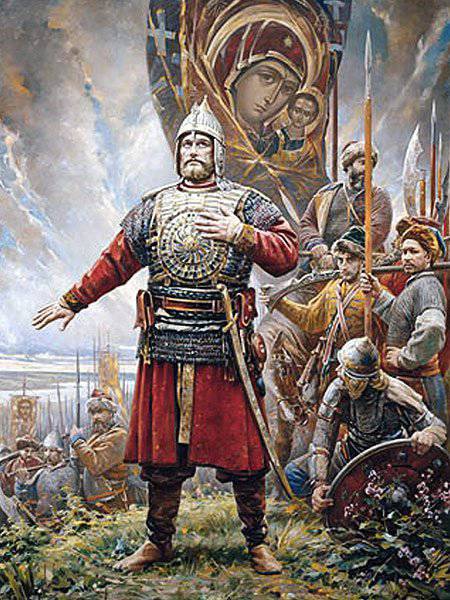
“From Colonel Mozyr, Cornish Osip Budzili, and all the knighthood,” answered the Poles to Prince Pozharsky on his offer of surrender, “in your letter, Pozharsky, who is not worthy enough for him to be heard by our noble ears.” We know well your Muscovites, valor and courage, we have not seen in any nation like you, in the affairs of chivalry you are worse than all the peoples of other states and monarchies. With courage, you are like an ass or a baibak, who, having no protection, is forced to hold on to a hole. Continue not to contact us with your Moscow foolishness, but rather you, Pozharsky, let your people go to the plowmen, let the slave continue to cultivate the land, but the pop knows church".
The reason for Polish arrogance is the blatant inconsistency of the actions of the Russian commanders, who failed to organize an effective siege in a few months. Prince Trubetskoy did not listen to Prince Pozharsky, Pozharsky did not coordinate his actions with Trubetskoy, and Prince Vasily Tyufyakin did not see them both at close range.
Organizational discord in the Russian militia bothered the Don Cossacks. They decided to abandon the barren siege of the Kremlin and go on "feeding" (that is, looting) in the northern and north-eastern cities of Muscovy, following the example of the Zaporozhian brothers.
Later, the court historians of the Romanovs defended the position that if the Cossacks left, nothing terrible would have happened. The militia took the Kremlin, and Mikhail Romanov took the throne. Although story does not tolerate the subjunctive mood, but there is every reason to think that if the Cossacks of the Donets in September 1612 had gone “to walk in the north”, everything would be exactly the opposite. The Kremlin, held by the nobility, the noble militia of Trubetskoy and Pozharsky would not capture, the Polish colonels Strus and Budzila would have waited for King Sigismund’s army to arrive in Moscow, and on the Moscow throne would establish Prince Vladislav, since a considerable number of Russian boyars had already sworn him.
However, the Don team eventually did not leave. Stung by the offer of the monks of the Trinity-Sergius Lavra to give them monarchies, robe and other sacred objects as a pledge of future payment, the Donians, in full compliance with their explosive, southern character, decided to “eat their saddlebags”, but remain. And on October 22, the Cossacks on their own, 1612, captured the fortress of China Town with one decisive blow. This operation instantly changed the perspectives of the Polish defense: the siege weapons, set up by Prince Pozharsky in China Town for direct fire, did not leave the Poles any chance of awaiting the de-blockade of Moscow by King Sigismund’s troops.
Polish officers, as professionals, already 24 October agreed to unconditional surrender.
The Cossacks, who captured China Town and thus created the main prerequisite for victory, waited for their heroic efforts to be adequately rewarded. But what could a plundered country have been able to give to the Donets to the bone, in the Kremlin's treasury of which there were oak vats filled with a terrible “food supply” - dismembered and salted human corpses?
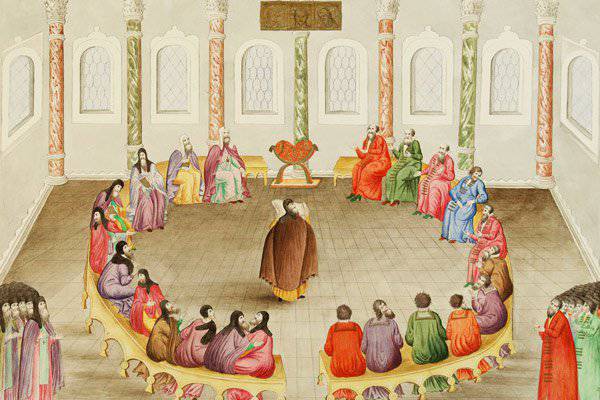
Pozharsky had only one chance to settle with the Cossacks: to deal with the boyars who had collaborated with the Poles in the years of the Troubles, to confiscate all their “stomachs” (all movable and immovable property), and then distribute the money and resources to the Cossacks of the Don Cossacks. But the prince did his best to physically protect the boyars from the wrath of the Cossacks. The Romanovs, Mstislavskys, Vorotynskys were recognized only as prisoners of the Poles.
“Popov to spare, but to cut the traitors and to have everything good” - this decision was made by the Don Cossacks at their descent on the eve of the Polish garrison surrender. Early in the morning of November 26, 1612, the Kremlin gates slowly, with a creak, opened and a timid crowd of figures of the Seven Boyars appeared on the stone Trinity Bridge, in the very tail of which the future “autocrat of All Russia” trudged, and Cossack speaking, “unmarked Mishatka Son of Romans” supported by his uncle Ivan Romanov.
Extreme exhaustion, miserable appearance of the figures of the Seven Boyars, played, apparently, not the last role in that the Cossacks, who came to the Trinity Bridge in full arms, did not rush to chop the boyars.
The anger and disillusionment of the Cossacks were fully experienced by precisely those people who, in accordance with the letter of the capitulation agreement, and even more so in accordance with the spirit of military honor, should have been spared. All the ordinary haiduks, as well as Polish officers, who fell into the hands of the Cossacks on 27 of October, were immediately killed.
Political Kaleidoscope of Russian Zemsky Sobor
The Zemsky Electoral Council, which was supposed to nominate the most worthy candidate from the entire Russian Land to the throne of Muscovy, gathered in the capital for the feast of Epiphany - January 6, 1613. In terms of its composition, it was a truly national forum: all clergy (including white), Moscow and city nobility, townspeople, and even black-rich peasants (the so-called county people) took part in its work.
The historian Vladimir Volkov has more than ten aspirants to the Russian throne, including even such an exotic character as the baby Ivan Dmitrievich, aka Vorenok, son of False Dmitry II, and the widow of Grishka Otrepyev of Marina Mnishek.
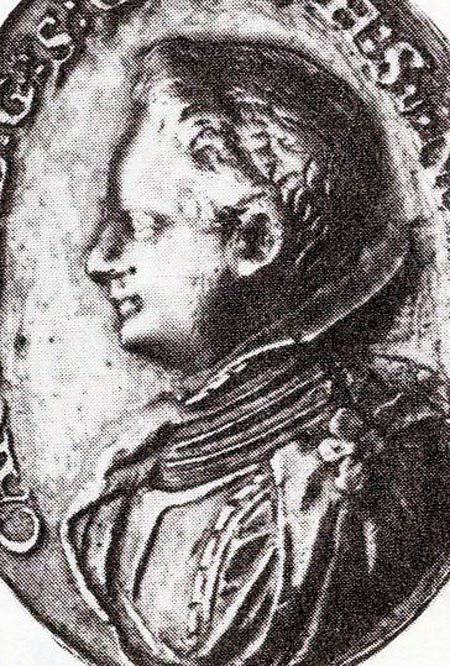
Without the support of the Don Cossacks, the chances of such a weak candidate, the painful teenager Mikhail Romanov, tended to zero. He did not add political weight to the family of the most active activists of the Seven Boyars, and the fact that his father, Metropolitan Filaret Romanov, was in Polish captivity during the Zemsky Sobor.
The real chances of being elected were apparently only two. The first is the well-known Rurikovich, Prince Dmitry Pozharsky. And the second - the Swedish Prince Carl Philip, the brother of King Gustav Adolf. Judging by some medieval sources, the chances of the Swedish prince, whose prerequisite for acceding to the Russian throne was the acceptance of Orthodoxy, were significantly higher.
In favor of Prince Carl Philip was the prestige of Sweden in the international arena, its moderation in dividing the inheritance of collapsed Muscovy, support for the Russian zemstvo of Veliky Novgorod, anti-Polish political course of King Gustav Adolf, finally, distinct support for the candidacy of the Swedish prince such as prestigious leaders of the Russian zemstvo as Prince Mikhail Skopin- Shuisky and Prokofy Lyapunov. In favor of the candidacy of the Swedish prince, Prince Dmitry Trubetskoy was apparently inclined.
Intrigues of the Romanovs and the Russian disarray
But it was not possible to agree at once on those who gathered at the Council. The split was strengthened by the position of the clergy, among whom the influence of the “Romanov's hierarch”, the great Metropolitan Paphnutius, sharply increased. Over the past few months, the Romanovs themselves “fed up” in their suburban estates and began active political intrigues, in the art of which only the Shuisky princes could equal themselves with them in Moscow.
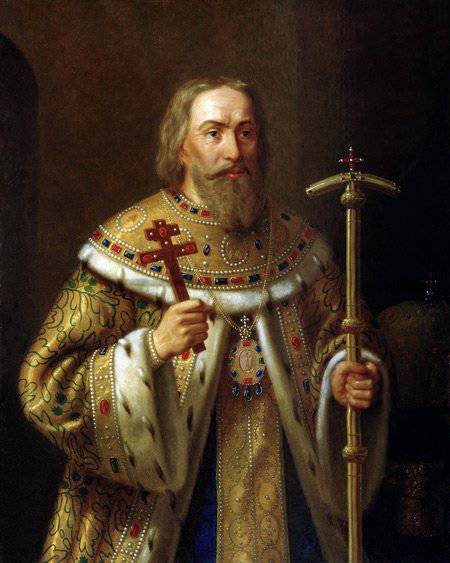
The small-scale, non-aristocratic nobility of the central regions of Muscovy, as well as some nobles of the second plan, such as Princes Lobanov and Lykov, who saw no prospects for the accession of the Swedish protege of "blood princes", gradually came over to the Romanovs.
At the same time, the military forces of Prince Trubetskoy and Prince Pozharsky weakened. Russian nobles from the Second Militia, who were pretty much fed up with the electoral intrigue that had been stretching for more than a month, gradually dispersed from Moscow in their patrimonies.
As they departed, the Romanovs and their surroundings became increasingly active, agitating not for Mikhail, but for his father, Metropolitan Philaret Romanov, whose personality was extremely popular among the Cossacks. It was Filaret, using the term of the clergy, who nursed in the faith in the Tushino camp all the Cossacks who had once supported both False Dmitriy.
Feeling that the political ground is slipping from under their feet and, hoping to somehow gain time, the princes Pozharsky and Trubetskoy made another, already fatal mistake: February 7 they announced a break in the work of the Zemsky Sobor for two weeks.
Cossack coup
Cossacks of the Don Cossacks received their 1612 of the year at the end of October, their first prize for the liberation of Moscow from the Poles. Then the princes Pozharsky and Trubetskoy decided to settle accounts with the ethnic Cossacks of the Don. As a result of the calculation of 11 thousands of “old Cossacks” received a tangible, although not too much salary: chieftains of seven rubles, the captains in six each, free ordinary Cossacks in five, plus a small amount of fodder money. Valuable Polish distributed to the majority weapon. A good horse from Muscovy was worth in those days, as the historian Boris Almazov points out, two rubles. A good Bashkir horse is from 6 to 10 rubles, Crimean Tatar - 20, for Arabic or Turkmen 100 rubles were paid. That is, the payment could not be called generous.
As the forces of the Russian noble militia gradually declined in Moscow, the Cossacks of the Don Cossacks and the Cossacks of Slobodskaya Ukraine coming to the capital behaved more and more arrogantly.
On the morning of February 21 was to begin after the break, a new stage in the work of the Zemsky Sobor. On this day, heavily armed Cossacks stormed into the Kremlin. Other detachments took the palace of Prince Pozharsky and then the palace of Prince Dmitry Trubetskoy into a tight ring. The leaders of the Russian noble militia did not have the slightest opportunity to resist: the Cossack rides were on duty at all departures from Moscow.
In the Kremlin, on the orders of the Don Atamans, all the boyars responsible for the procedure of electing the new Tsar of Muscovy were dragged together. Atamans, without distant near-personalities, asked them a simple question: who were they going to elect ruler of Russia? The answer of the boyars, judging by the testimony of the author of "The Tale of the Zemsky Sobor 1613 of the Year" was the most lowly worshiping: "Bolyar is the verb:" The royal birth passed away [the Cossacks knew this very well], but we will put a live hope on God [ it was very important for the boyars precisely at that moment], and according to your thoughts, the chieftains and the entire Cossack army, whom it should be like the king [i.e. the opinion of the Cossacks was already recognized as decisive], but a little from the boyars' nobles, what Prince Fedor Ivanovich Mstislavsky is, what Prince Ivan Mikhailovich Vorotynsky is, what Prince Dmitry Timofeevich Trubetskoy is. And so all by name and the eighth of Pronskago.
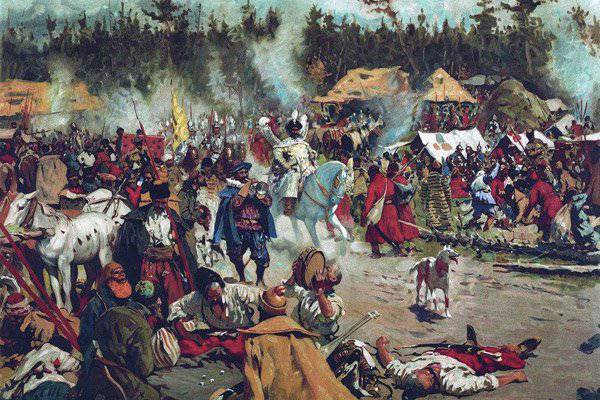
Atamans busily inquired: what will be the election procedure? The boyars answered them: “Yes, they will be elected by them and by a draw, but to whom God will give.” Thus, the traditional old Russian method of election was proposed - by choosing a blind monk or a very young male child of one nominal lot out of eight lots of all applicants arbitrarily arranged on the church altar.
The Cossacks were so unpredictable on the basis of the election did not like the procedure. Boyars were told that “Prince Fyodor Ivanovich of All Russia,” that is, the last son of Ivan the Terrible, blessed, allegedly) “to keep Prince Fyodor Nikitich Romanov of Russia,” the current Metropolitan Philaret. And as soon as Filaret “is now full in Lithuania, then there is a good and honorable cause for the root and the branch, his son Prince Mikhail Fyodorovich”. “May it befitting according to God's will,” the Cossacks sincerely gave their will for God, “in the city of Moscow and All Russia reign over the sovereign and Grand Duke Mikhail Fedorovich.”
The question of how the intimidated boy Mikhail really reigned least of all seemed to be concerned about the Cossacks. Therefore, the Cossacks, in a friendly way, recommended Ivan Romanov not to worry too much about this: “... You, Ivan Nikitich, are old, full of reason, and he, the sovereign, is a born uncle in the flesh, and you will have good strength for him”.
According to an old Cossack legend, - after these words, one of the chieftains, staring at the stunned boyars in the eye, firmly put a written “Ataman formal reply” on the table, demanding that Mikhail Romanov be approved as the only candidate for the throne. On the text of the diploma, the ataman carelessly threw a bare sword.
The election of a strange youth to the royal throne of Muscovy by the “divine will” of the rebel Cossacks did not contribute to the authority of the new dynasty. In Poland, Chancellor Lev Sapieha contemptuously told the captive Metropolitan Philaret: "Only Cossacks from the Don were imprisoned your son in Moscow State." In the “Liszt of Zemstvo people of Novgorod the Great to the prince Karl Philip” they confessed: “... In the Moscow State, thieves overpowered good people; we also learned that in the Moscow State, the Cossacks, without the consent of the boyars, the governors and nobles, and the best people of all ranks, by their theft put Mikhail Romanov as a ruler. ”
Unlike all others, the Cossacks were very pleased, especially at first, with their choice. The new sovereign again generously rewarded the Don, introduced for the Cossacks of the Don Army the right of duty-free trade in all Russian cities, sent a rich "sovereign leave" and a personal "salted" banner to the Don. In addition, in Moscow, a special ministry, the Cossack Order, was established to promptly solve all the problems that arise with the Cossacks. Boyars Romanovs, to sit on the throne of Muscovy, conducted thoughtful work on the "Cossack mistakes" of the kings Boris Godunov and Vasily Shuisky.
Information